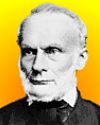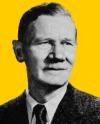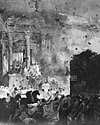
On 24 Aug 1861, Pierre Berthier died, a French mineralogist and mining engineer who discovered bauxite (aluminium ore) on 23 Mar 1821 near the village Les Baux de Provence in southern France. He described its properties, and coined its name after the town where he found it. Wöhler had isolated the metal in 1846, and from 1855 it was being manufactured in small quantities by such an expensive process, it cost $32 per pound - back then! Although aluminium is the most abundant metal in the earth's crust, it was thus only relatively recently that bauxite, now the widely used ore was found, unlike iron, or bronze which characterized ancient eras.
Berthier had started his career in 1806 by joining the central laboratory at the Board of Mines. From 1816, he was chief of the laboratory at the École des Mines, and professor of assaying. Berthier analyzed kaolin along with dozens of other minerals and ores. He sought out phosphate deposits valuable for agriculture. So Berthier had much to accomplish without being side-tracked by trying to separate the metal from its ore, which was such a difficult task at the time, that the element was considered a precious metal. Reflect on that, the next time you toss ot a soda can!
An article in Scientific American published the address J.A. Price delivered in January 1886 about Aluminium. At the time, aluminium was still something of a wonder, so you can learn some interesting early history of the metal, before Charles Hall invented the process which would make it commonplace.

On 24 Aug 2006, the International Astronomical Union voted Pluto out of planethood. That instantly put millions of encyclopedias listing the “nine planets” out of date. It is now the extraterrestrial underdog. (That's a pun - Disney created an irresistible pup they called Pluto.) As one NASA scientist put it, Pluto was “discovered by an American for America.” For decades Pluto had stood as the only “planet” discovered by an American. So Pluto is entrenched in our cultural, patriotic view of the cosmos.
But Pluto’s rock and ice composition, backward rotation and problematic orbit raised suspicions. As the question of Pluto’s nature was being debated by scientists, the newly constructed Rose Center for Earth and Space at the Hayden Planetarium quietly but definitively relegated Pluto to the icy realm of Kuiper Belt Objects (cold, distant leftovers from the solar system's formation), raising a firestorm. Astronomers discussed and argued and finally created an official definition of what makes a planet. And Pluto didn’t fit the new definition.
Today's book pick is: The Pluto Files: The Rise and Fall of America's Favorite Planet, by Neil deGrasse Tyson. Only Tyson can tell this story: he was involved in the first exhibits to demote Pluto, and, consequently, Pluto lovers have freely shared their opinions with him, including endless hate mail from third graders. This account, if a bit Tyson-centric, presents the medicine of hard science with a sugarcoating of lightness and humor. In his typically witty way, Tyson explores the history of Pluto, so recently relegated to be merely a dwarf planet.
It is available from Amazon, typically about New from $29.95. Used from $1.99. (As of earlier time of writing - subject to change.)
 | The production of motion in the steam engine always occurs in circumstances which it is necessary to recognize, namely when the equilibrium of caloric is restored, or (to express this differently) when caloric passes from the body at one temperature to another body at a lower temperature. |
 | In all cases where work is produced by heat, a quantity of heat proportional to the work done is expended; and inversely, by the expenditure of a like quantity of work, the same amount of heat may be produced. |
 | Until 1930 or thereabout biologists [using microscopes], in the situation of Astronomers and Astrophysicists, were permitted to see the objects of their interest, but not to touch them; the cell was as distant from us, as the stars and galaxies were from them. |
| Before you look at today's web page, see if you can answer some of these questions about the events that happened on this day. Some of the names are very familiar. Others will likely stump you. Tickle your curiosity with these questions, then check your answers on today's web page. | |
| Births | |
 | Albert Claude, Rudolf Geiger and Sir Daniel Gooch were each born on 24 Aug, though in different years. Not in the same order, they were notable for: a founder of microclimatology; laid the first successful transatlantic cables; developing the principal methods of separating and analyzing components of the living cell. Can you match each scientist to his claim to fame? |
| Deaths | |
 | Carl William Blegen (1887-1971) was an archaeologist who found striking evidence to substantiate and date the sack of the city described in Homer's Iliad Can you name the city? |
 | A German mathematical physicist (1822-1888) is credited with making thermodynamics a science. Can you name this man? |
 | Sadi Carnot (1796-1832) was a physicist who originated a theorem which says that a maximum efficiency of heat engine can be obtained by a reversible engine, and that efficiency depends only on the temperatures of the hot and the cool sources of the engine. This theorem played an essential role for the subsequent development of thermodynamics. What was this man's nationality? |
| Events | |
 | On 24 Aug in 79, A.D., a long-dormant volcano erupted in Italy, burying the Roman cities of Pompeii and Herculaneum in volcanic ash. What is the name of this volcano? |
 | On 24 Aug of a certain year, France exploded a hydrogen bomb at a South Pacific testing ground on Mururoa and became the world's fifth thermonuclear power. In what decade was this bomb test made? |
 | On 24 Aug 1932, the first woman to fly non-stop across the United States, travelled from Los Angeles to Newark, N.J., in just over 19 hours. Can you name this woman? |
Fast answers for the previous newsletter for August 23: Surgeon General of the United States. • William Henry Eccles = radio; Osborne Reynolds = hydraulics and hydrodynamics; Georges Cuvier = established the sciences of comparative anatomy and paleontology • Charles-Augustin de Coulomb • Ornithology, to produce a nine-volume set of books on North American birds • Gossamer Condor • The decade of 1966.
 If you enjoy this newsletter, the website, or wish to offer encouragement or ideas, please send feedback by using your mail reader Reply button.
If you enjoy this newsletter, the website, or wish to offer encouragement or ideas, please send feedback by using your mail reader Reply button. Your click on a Facebook, StumbleUpon, or other social button on the site webpages is also a welcome sign of appreciation. Thank you for using them.
© This newsletter is copyright 2020 by todayinsci.com. Please respect the Webmaster's wishes and do not put copies online of the Newsletter — or any Today in Science History webpage. (If you already have done so, please remove them. Thank you.) Offline use in education is encouraged such as a printout on a bulletin board, or projected for classroom viewing. Online, descriptive links to our pages are welcomed, as these will provide a reader with the most recent revisions, additions and/or corrections of a webpage. For any other copyright questions, please contact the Webmaster by using your mail reader Reply button.
--
If you do not want to receive any more newsletters, Unsubscribe
To update your preferences and to unsubscribe visit this link
Executive Real Estate Business Class
-
"It was like a man with wings. It wasn't like anything you'd see on TV or in a monster movie." ...
About the publisher
Search This Blog
Blog Archive
-
▼
2021
(585)
-
▼
August
(32)
- Newsletter for Tuesday 31 August.
- Newsletter for Monday 30 August.
- Newsletter for Sunday 29 August.
- Newsletter for Saturday 28 August.
- Newsletter for Friday 27 August.
- Newsletter for Thursday 26 August.
- Newsletter for Wednesday 25 August.
- Newsletter for Tuesday 24 August.
- Newsletter for Monday 23 August.
- All-New Tonight: 'The Machines That Built America'
- Newsletter for Sunday 22 August.
- Newsletter for Saturday 21 August.
- Newsletter for Friday 20 August.
- Newsletter for Thursday 19 August.
- Newsletter for Wednesday 18 August.
- Newsletter for Tuesday 17 August.
- Newsletter for Monday 16 August.
- Newsletter for Sunday 15 August.
- Newsletter for Saturday 14 August.
- Newsletter for Friday 13 August.
- Newsletter for Wednesday 11 August.
- Newsletter for Tuesday 10 August.
- Newsletter for Monday 9 August.
- All-New Tonight 9/8c: Telephone Wars
- Newsletter for Sunday 8 August.
- Newsletter for Saturday 7 August.
- Newsletter for Friday 6 August.
- Newsletter for Thursday 5 August.
- Newsletter for Wednesday 4 August.
- Newsletter for Tuesday 3 August.
- Newsletter for Monday 2 August.
- Newsletter for Sunday 1 August.
-
▼
August
(32)
-
Blogroll
-
About
HistoryFact










0 comments:
Post a Comment